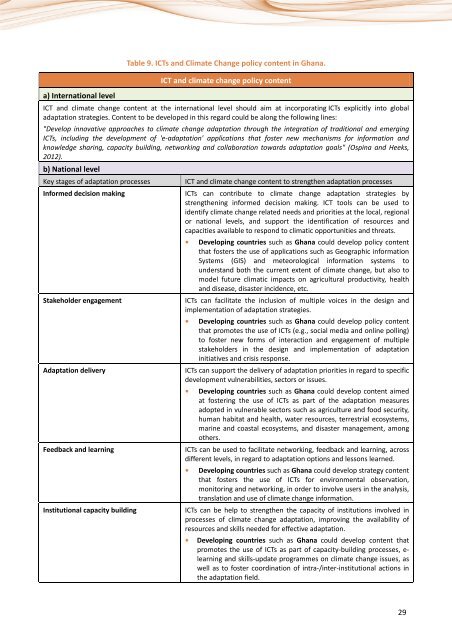Information and communication technologies (ICTs) and ... - ITU
Information and communication technologies (ICTs) and ... - ITU
Information and communication technologies (ICTs) and ... - ITU
You also want an ePaper? Increase the reach of your titles
YUMPU automatically turns print PDFs into web optimized ePapers that Google loves.
a) International level<br />
Table 9. <strong>ICTs</strong> <strong>and</strong> Climate Change policy content in Ghana.<br />
ICT <strong>and</strong> climate change policy content<br />
ICT <strong>and</strong> climate change content at the international level should aim at incorporating <strong>ICTs</strong> explicitly into global<br />
adaptation strategies. Content to be developed in this regard could be along the following lines:<br />
"Develop innovative approaches to climate change adaptation through the integration of traditional <strong>and</strong> emerging<br />
<strong>ICTs</strong>, including the development of 'e-adaptation' applications that foster new mechanisms for information <strong>and</strong><br />
knowledge sharing, capacity building, networking <strong>and</strong> collaboration towards adaptation goals" (Ospina <strong>and</strong> Heeks,<br />
2012).<br />
b) National level<br />
Key stages of adaptation processes<br />
ICT <strong>and</strong> climate change content to strengthen adaptation processes<br />
Informed decision making<br />
<strong>ICTs</strong> can contribute to climate change adaptation strategies by<br />
strengthening informed decision making. ICT tools can be used to<br />
identify climate change related needs <strong>and</strong> priorities at the local, regional<br />
or national levels, <strong>and</strong> support the identification of resources <strong>and</strong><br />
capacities available to respond to climatic opportunities <strong>and</strong> threats.<br />
• Developing countries such as Ghana could develop policy content<br />
that fosters the use of applications such as Geographic information<br />
Systems (GIS) <strong>and</strong> meteorological information systems to<br />
underst<strong>and</strong> both the current extent of climate change, but also to<br />
model future climatic impacts on agricultural productivity, health<br />
<strong>and</strong> disease, disaster incidence, etc.<br />
Stakeholder engagement<br />
<strong>ICTs</strong> can facilitate the inclusion of multiple voices in the design <strong>and</strong><br />
implementation of adaptation strategies.<br />
• Developing countries such as Ghana could develop policy content<br />
that promotes the use of <strong>ICTs</strong> (e.g., social media <strong>and</strong> online polling)<br />
to foster new forms of interaction <strong>and</strong> engagement of multiple<br />
stakeholders in the design <strong>and</strong> implementation of adaptation<br />
initiatives <strong>and</strong> crisis response.<br />
Adaptation delivery<br />
<strong>ICTs</strong> can support the delivery of adaptation priorities in regard to specific<br />
development vulnerabilities, sectors or issues.<br />
• Developing countries such as Ghana could develop content aimed<br />
at fostering the use of <strong>ICTs</strong> as part of the adaptation measures<br />
adopted in vulnerable sectors such as agriculture <strong>and</strong> food security,<br />
human habitat <strong>and</strong> health, water resources, terrestrial ecosystems,<br />
marine <strong>and</strong> coastal ecosystems, <strong>and</strong> disaster management, among<br />
others.<br />
Feedback <strong>and</strong> learning<br />
<strong>ICTs</strong> can be used to facilitate networking, feedback <strong>and</strong> learning, across<br />
different levels, in regard to adaptation options <strong>and</strong> lessons learned.<br />
• Developing countries such as Ghana could develop strategy content<br />
that fosters the use of <strong>ICTs</strong> for environmental observation,<br />
monitoring <strong>and</strong> networking, in order to involve users in the analysis,<br />
translation <strong>and</strong> use of climate change information.<br />
Institutional capacity building<br />
<strong>ICTs</strong> can be help to strengthen the capacity of institutions involved in<br />
processes of climate change adaptation, improving the availability of<br />
resources <strong>and</strong> skills needed for effective adaptation.<br />
• Developing countries such as Ghana could develop content that<br />
promotes the use of <strong>ICTs</strong> as part of capacity-building processes, e-<br />
learning <strong>and</strong> skills-update programmes on climate change issues, as<br />
well as to foster coordination of intra-/inter-institutional actions in<br />
the adaptation field.<br />
29

















